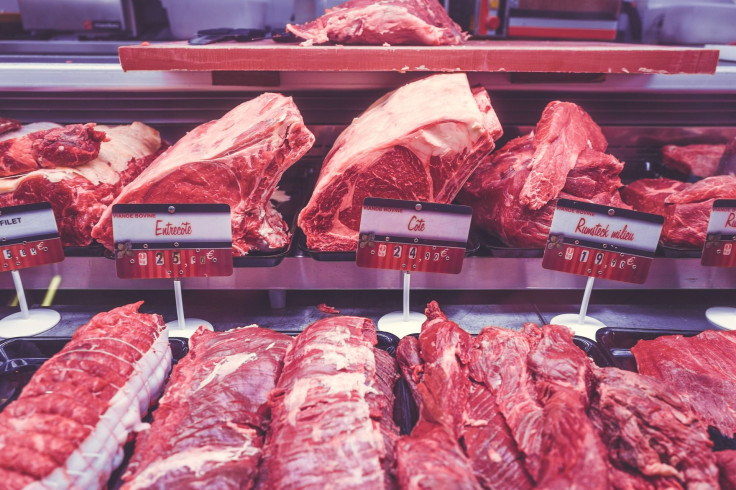In Wisconsin, Holiday Cheer Is a Raw Meat Sandwich

For some of us, it is eggnog, for others, it's Grandma’s famous gingerbread.
Who hasn't got a favorite holiday food?
In the state of Wisconsin, where cheese, dairy cows and cold (average high in winter, 23 degreees) reign, some just go for the meat.
And it's raw. While this might be a regional treat, most people in the healthcare field, it's fair to say, would frown upon such consumption.
To wit: The Wisconsin Department of Health. It recently sent out its annual reminder about this holiday tradition on Facebook. "Time for our annual reminder that there's one #holiday tradition you need to pass on: raw meat sandwiches."
Raw meat sandwiches may not be a national tradition, but they’re famous in Wisconsin. According to the Department of Health’s website, they are also called tiger meat or cannibal sandwiches. “For some Wisconsinites, it’s a tradition to eat raw ground beef dishes,” reads the Department of Health’s website, “It is important to know that eating these types of foods is not without risks.” Said risks include foodborne bacteria like Salmonella, E. coli and Listeria.
No idle threat. According to the department, in the last 24 years there have been eight outbreaks linked to “Tiger Meat”.
Fans and Foes
Of course, it wouldn’t be a Facebook post without comments. Of the over 700 comments, many were defending the practice. Trevor LeRene wrote, “Nope. As much as I respect the Dept of Health, I’ve been eating them since I was 6. I’m not stopping now.” Austin Frederick even had some cooking advice: “A little pepper, some onions, and then slap it on a piece of rye bread.”
Some commenters defended the dish, comparing the raw burger sandwich to steak tartare, made from ground meat that is often served with a raw egg yolk on top. Others suggested getting certain cuts of meat to ensure safety.
Of course, not everyone was a fan, one woman wrote, “I ate one of these in my life, 2 weeks before my wedding in 1976, and ended up in the hospital for almost a week. Never again!”
The advice also appeared on Twitter, tweeted out by the Department of Health, and picked up by sandwich aficionados everywhere. The gourmets were joined by the politically conscious. The fans accused the foes -- all in good humor -- of being bourgeois and classist, And the one-liners flew.
As we all know, back in the day only the top 1% of cavemen could make fires to cook their meat
— Sharcky _ (@Sharcys) December 14, 2020
Fire is bourgeoisie.
— Leave no one behind (@shewz) December 13, 2020
For some, it was the images that evoked a reaction.
— _ keanna (@justkeex) December 12, 2020
People aren’t the sandwiches' only detractors. The USDA posted some tips for would-be sandwich eaters, saying, “ If cannibal sandwiches are a tradition in your home, try this safe alternative: cook the ground beef with the same spices and toppings, until it reaches 160°F, and serve it on top of bread or crackers. You may be surprised to find that it tastes better when cooked!”
Risky business
There is an extra risk this year. Foodborne illness, like Salmonella, E.coli or Listeria can mean a trip to the hospital. With cases of Covid-19 surging, hospital space is at a premium and people are being encouraged to avoid unnecessary trips to the hospital. Food poisoning can be an emergency, but it is also avoidable.
Although all the bacteria are nasty, Listeria poses an extra risk to pregnant women, as it can get across the placenta and possibly harm the fetus. Salmonella and E.coli can also be especially dangerous when someone is pregnant.
The general feeling seems to be that it would be safer to use fire, but for people who are convinced that raw meat won't harm them, the best thing to use is a cut of beef bought from a trustworthy butcher and consume it the same day.
A protective firewall
Although some restaurants serve raw meat or rare steak, their menus often bear a warning about possible health hazards. In a McGill University article about eating raw meat, Joe Schwarcz, PhD, explained some of the science. According to Dr. Schwarcz, during the butchering process, bacteria from the intestines of a cow can get onto the meat. In the case of a rare steak, cooking kills any bacteria on the outside of the meat and the bacteria cannot get to the inside of the meat. So, even though it is undercooked, it is safe. But, with ground hamburger meat, or home-ground tartare, the outside bits of meat get mixed together with the inside bits of meat. If the cut of beef had been contaminated, the bacteria would now be spread throughout.
One thing is for sure: This is not the year to risk anything that will land you in the emergency room.



























